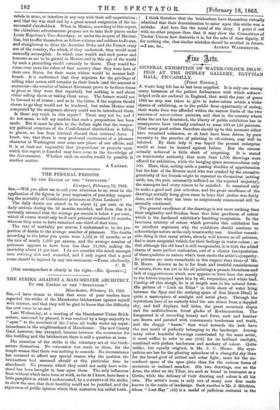Manchester, February 15, 1865. SIR,—I have reason to think that
some of your readers have regarded the strike of the Manchester bricksetters against myself with interest, and that they will be glad to know that the difficulty has now come to an end.
Last Wednesday, at a meeting of the Manchester Union Brick- setters, convened by placard, it was resolved by a large majority to " open " to the members of the Union all works under my super- intendence in the neighbourhood of Manchester. The new County Gaol, however, was excepted, because between the contractor for this building and the bricksetters there is still a question at issue.
The cessation of the strike is the voluntary act of the brick- setters themselves. No concession was made to them, for the simple reason that there was nothing to concede. No circumstance has occurred to afford any special reason why the position the bricksetters had assumed should at this particular time be abandoned. No pressure which they could not easily have with- stood has been brought to bear upon them. The only influences from without which have been at work, so far as I know, have been a little pamphlet in which I endeavoured, by a narrative of the strike, to show the men that their hostility could not be justified, and the expression of public opinion which that narrative has called forth.
I think therefore that the bricksetters have themselves virtually admitted that their determination to enter upon this strike was a mistake. And here lies the moral of the story. I point it out with no other purpose than that it may show the Committees of Trades' Unions how desirable it is, for the sake of their dignity, if for nothing else, that similar mistakes should be avoided in future.






























 Previous page
Previous page